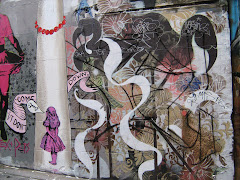One of the persons teaching me to teach once said: "Get some absurdity into the classroom and you'll get fun." This is perhaps the most important thing I learned during my teacher training. Humor is a tremendously powerful positive force we should use.
There are many ways to do this – some as small as integrating funny methods to greet each other at the beginning of a lesson. It is a way of playing with the usual and expected, creating a meaningful difference that makes us laugh. Part of the reason why humor makes us relaxed and be open is probably the fact that it helps us understand that we are not absulutely defined and/or oppressed by the social norms that structure our cultural existence.
There also is a relationship between humor and creativity. To be creative requires us to go above and beyond what is usual and expected, too, and I believe that the integration of absurdity into teaching can be a strong motivation to be creative.
Although the difference created by absurdity can only be meaningful if it is related to established norms, I think it is unproblematic not to reinforce such norms by using respective activities. I am afraid this is not so easy when it comes to jokes, funny stories, humorous theatre plays etc. These have a narrative character, and you need at least some conventions to narrate. This can be problematic as you have to rely on some norms to put others into doubt or to ridicule them/ make them seem funny in some way.
By creating a funny atmosphere, teachers help their students to relax and be open. Yet, if the norms/conventions reinforced by a joke seem unhealthy/oppressive etc. it might turn out to be a dangerous situation for the students.
Social codes conveyed by humor should be much easier to internalize for them and much more difficult to withstand and deny. Messages implicit in the setting/background can be extremely hard to reject for children, especially if they are enforced in a fun and incidental way.
So while humor can be very liberating and motivating, we have to be careful to ensure its alleviating character with regard to social norms.
There are many ways to do this – some as small as integrating funny methods to greet each other at the beginning of a lesson. It is a way of playing with the usual and expected, creating a meaningful difference that makes us laugh. Part of the reason why humor makes us relaxed and be open is probably the fact that it helps us understand that we are not absulutely defined and/or oppressed by the social norms that structure our cultural existence.
There also is a relationship between humor and creativity. To be creative requires us to go above and beyond what is usual and expected, too, and I believe that the integration of absurdity into teaching can be a strong motivation to be creative.
Although the difference created by absurdity can only be meaningful if it is related to established norms, I think it is unproblematic not to reinforce such norms by using respective activities. I am afraid this is not so easy when it comes to jokes, funny stories, humorous theatre plays etc. These have a narrative character, and you need at least some conventions to narrate. This can be problematic as you have to rely on some norms to put others into doubt or to ridicule them/ make them seem funny in some way.
By creating a funny atmosphere, teachers help their students to relax and be open. Yet, if the norms/conventions reinforced by a joke seem unhealthy/oppressive etc. it might turn out to be a dangerous situation for the students.
Social codes conveyed by humor should be much easier to internalize for them and much more difficult to withstand and deny. Messages implicit in the setting/background can be extremely hard to reject for children, especially if they are enforced in a fun and incidental way.
So while humor can be very liberating and motivating, we have to be careful to ensure its alleviating character with regard to social norms.







Keine Kommentare:
Kommentar veröffentlichen